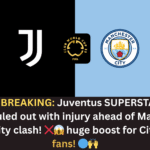Erling Haaland reaches significant goalscoring milestone in Man City’s dominant win over Juventus

In a night that will be etched in football history, Erling Haaland achieved a remarkable personal milestone while Manchester City delivered a statement performance against Juventus in the FIFA Club World Cup. The Norwegian striker’s 300th career goal came during City’s emphatic 5-2 victory over the Italian giants at Orlando’s Camping World Stadium, a result that not only secured their progression as Group G winners but also highlighted the continued dominance of Pep Guardiola’s side on the global stage.
A Milestone Years in the Making
At just 24 years of age, Haaland’s achievement of 300 goals in 371 appearances represents one of the most extraordinary goalscoring records in modern football. To put this accomplishment into perspective, the Norwegian has maintained an average of 0.81 goals per game throughout his professional career—a ratio that places him among the elite strikers of any generation.
The landmark goal arrived in the 52nd minute of what had already proven to be an entertaining encounter in Florida. Having been strategically rested by Guardiola for the first half, Haaland was introduced at the interval with Manchester City holding a slender 2-1 advantage. It took the prolific striker just seven minutes to make his mark, converting what he would later describe as an “unconvincing” finish from Matheus Nunes’ perfectly weighted square pass.
While Haaland may have been characteristically modest about the technical quality of his milestone strike, the significance of the moment was not lost on anyone present at the Camping World Stadium. The goal represented not just a personal achievement but a testament to the remarkable consistency and clinical finishing ability that has defined his career since his professional debut.
The Anatomy of a Goal Machine
Haaland’s journey to 300 goals reads like a masterclass in modern striker development. His remarkable tally is distributed across several clubs and the international stage, each chapter of his career contributing to what has become one of football’s most impressive goal-scoring narratives.
His time at Manchester City has been particularly prolific, with 123 strikes in just 145 matches since his high-profile move from Borussia Dortmund. This period has seen Haaland adapt seamlessly to Guardiola’s tactical system, proving that his goal-scoring prowess transcends different playing styles and league contexts. The symbiotic relationship between City’s creative midfield and Haaland’s predatory instincts in the penalty area has produced some of the most clinical finishing seen in the Premier League era.
The foundation for this success was laid during his time in the Bundesliga with Borussia Dortmund, where he netted 86 goals in 89 appearances. This period established Haaland as one of Europe’s most coveted strikers and demonstrated his ability to perform consistently at the highest level of club football. His time in Germany was characterized by spectacular Champions League performances and a goal-scoring rate that defied conventional expectations for a player of his age.
Earlier in his career, Haaland’s development through Norwegian football with Molde (20 goals) and his brief but explosive stint at Red Bull Salzburg (29 goals) provided the foundation for his later success. These formative experiences in different football cultures and tactical systems contributed to the well-rounded striker who would eventually take European football by storm.
Perhaps most impressively, Haaland has maintained his scoring prowess at international level, netting 42 goals in 43 appearances for Norway. This international record is particularly noteworthy given the limited opportunities for goal-scoring that typically characterize international football, where matches are often cagey affairs between well-organized defensive units.
City’s Tactical Masterclass in Orlando
The victory over Juventus showcased more than just individual brilliance; it demonstrated the tactical sophistication that has made Manchester City one of the world’s most formidable teams. Guardiola’s decision to rest Haaland for the first half was a calculated move that reflected both the manager’s confidence in his squad depth and his strategic thinking for the tournament’s later stages.
The opening 45 minutes saw City take control through their characteristic possession-based approach, with the team building a 2-1 lead through intricate passing combinations and well-timed attacking movements. This performance without their star striker highlighted the collective strength of Guardiola’s squad and their ability to create scoring opportunities through various tactical approaches.
Haaland’s introduction at halftime provided the catalyst for City’s second-half dominance. His immediate impact—scoring within seven minutes of his appearance—demonstrated the psychological effect his presence can have on both teammates and opponents. The Norwegian’s movement in the penalty area created space for other attackers while his clinical finishing ability provided the cutting edge that transformed a competitive match into a comprehensive victory.
Phil Foden’s contribution to the fourth goal exemplified City’s attacking versatility, while Savinho’s stunning fifth goal showcased the depth of talent available to Guardiola. Even Dusan Vlahovic’s late consolation goal for Juventus, though reducing the deficit, could not diminish the overall impression of City’s superiority throughout the encounter.
The Club World Cup Context
This victory against Juventus came in the context of Manchester City’s impressive Club World Cup campaign, where they have demonstrated their intent to add this prestigious trophy to their already extensive collection. The tournament format, featuring the world’s best club teams, provides a unique opportunity for sides like City to test themselves against different styles of play from various continents.
City’s 6-0 victory over Al-Ain in their previous group stage match had already signaled their serious intentions in the competition. Haaland’s goal in that encounter, combined with his strike against Juventus, has positioned him well in the race for the tournament’s Golden Boot award.
The competition for the top scorer prize remains intense, with Haaland currently tied with several other notable strikers on two goals. Michael Olise, Kenan Yildiz, Wessam Abou Ali, Angel Di Maria, and Jamal Musiala all share the current leading tally, setting up an intriguing battle for individual honors as the tournament progresses.
For Haaland, the potential addition of a Club World Cup Golden Boot would represent another significant achievement in his rapidly expanding trophy collection. Having already claimed two Premier League Golden Boots and the European Golden Shoe, the Norwegian has consistently demonstrated his ability to perform when individual accolades are at stake.
Historical Perspective and Future Implications
Haaland’s 300-goal milestone at age 24 places him in truly elite company among football’s greatest goal-scorers. When compared to legendary strikers throughout football history, his achievement becomes even more remarkable. Many of the game’s most celebrated marksmen took significantly longer to reach similar tallies, often achieving such numbers well into their thirties.
The speed with which Haaland has reached this milestone raises fascinating questions about what the remainder of his career might hold. If he can maintain his current trajectory while avoiding serious injury, the Norwegian could potentially challenge some of football’s most sacred goal-scoring records.
His success also reflects broader changes in modern football, where advanced analytics, sports science, and tactical evolution have created environments that can maximize the potential of naturally gifted strikers. Haaland’s development represents the perfect intersection of raw talent, professional preparation, and tactical systems designed to optimize goal-scoring opportunities.
The Guardiola Factor
Pep Guardiola’s influence on Haaland’s development cannot be understated. The Spanish manager’s tactical approach has provided the perfect framework for the Norwegian’s skills to flourish. City’s possession-based system creates numerous scoring opportunities through patient build-up play, while their pressing intensity often results in high-quality chances in dangerous areas.
Guardiola’s rotation policy, evidenced by his decision to rest Haaland against Juventus, demonstrates the manager’s long-term thinking and his understanding of how to maintain players at peak performance levels throughout demanding seasons. This approach has allowed Haaland to remain fresh and sharp when his contributions are most needed.
The tactical relationship between manager and striker has evolved throughout their time together, with Haaland adapting his game to fit Guardiola’s requirements while the system has been adjusted to maximize the Norwegian’s strengths. This mutual adaptation has created one of the most effective attacking partnerships in modern football.
Looking Ahead: Tournament Prospects
As Manchester City progresses through the Club World Cup knockout stages, Haaland’s form will be crucial to their chances of claiming the trophy. The tournament represents an opportunity for City to achieve a milestone that has previously eluded them, despite their domestic and European success in recent years.
The quality of opposition in the later rounds will provide stern tests of both individual and collective ability. Teams from different continents bring varied tactical approaches and playing styles, requiring adaptability from players like Haaland who must adjust their game to different defensive strategies.
For Haaland personally, the tournament offers the chance to add another significant trophy to his collection while potentially claiming individual honors. His pursuit of the Golden Boot adds an extra dimension to City’s campaign, providing motivation beyond the team’s collective goals.
The Global Impact
Haaland’s achievement resonates beyond the immediate context of the match or tournament. His success serves as inspiration for young strikers worldwide, demonstrating what can be achieved through dedication, natural ability, and the right professional environment.
The Norwegian’s multicultural football education—spanning Norway, Austria, Germany, and England—reflects the increasingly global nature of modern football development. His success in different leagues and tactical systems provides a template for how modern strikers can maximize their potential through diverse experiences.
His impact on Manchester City’s commercial and sporting profile has been immense, with his signing representing a statement of intent that has elevated the club’s global profile even further. The marketability of a player achieving such milestones at a young age creates value that extends far beyond on-pitch performance.
Conclusion: A Milestone Among Many
As Erling Haaland celebrated his 300th career goal in the Florida sunshine, surrounded by teammates and watched by millions worldwide, the moment represented both a significant achievement and a stepping stone toward even greater accomplishments. At 24, with his peak years still ahead of him, the Norwegian has already established himself among football’s elite goal-scorers.
Manchester City’s victory over Juventus provided the perfect backdrop for this milestone, demonstrating the collective strength that has made individual brilliance possible. As the Club World Cup continues, both Haaland and his team will be focused on adding more trophies to their collection, but this moment in Orlando will be remembered as a significant marker in one of football’s most remarkable careers.
The 300-goal milestone is not just a number; it represents the culmination of years of dedication, improvement, and performance at the highest level. For Haaland, it marks another chapter in what promises to be a legendary career, while for football fans worldwide, it provides another opportunity to witness greatness in action.
As City progresses through the tournament and Haaland continues his pursuit of more goals and more trophies, this milestone will serve as a reminder of what makes football special: the ability of exceptional individuals to achieve extraordinary things while contributing to collective success. In a sport where moments of individual brilliance can define careers and create lasting memories, Haaland’s 300th goal represents both an end and a beginning—the completion of one remarkable journey and the start of what promises to be an even more spectacular chapter in his continuing story.















